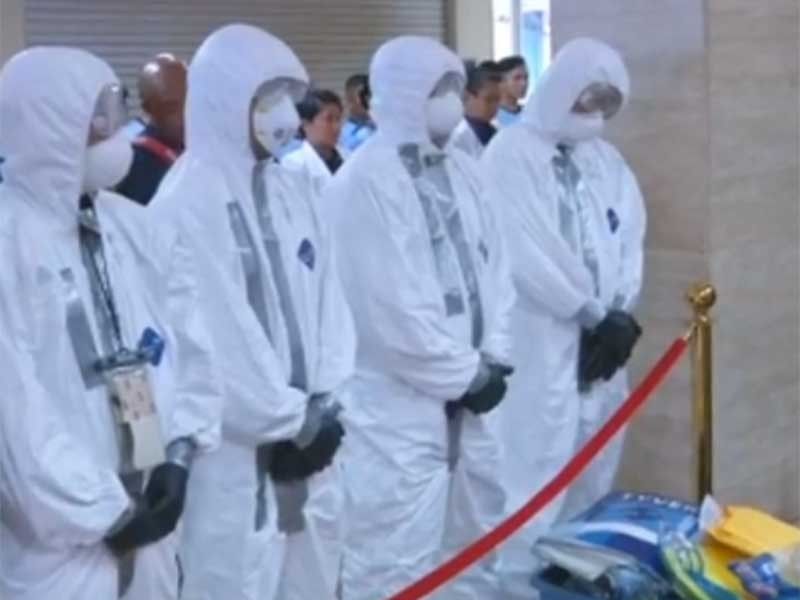CBRNE-trained police team ready to assist with repatriation of Filipinos in Hubei

MANILA, Philippines — A team of police doctors trained in responding to chemical and biological threats is ready to help combat the spread of the novel coronavirus and assist in repatriation efforts for Filipinos in Wuhan and th rest of China's Hubei province.
Police Gen. Archie Francisco Gamboa, Philippine National Police chief, at a press briefing on Monday said the national police "has made available a team of [Chemical, Biological, Radiological, Nuclear and high-yield Explosives]-trained medical personnel from the PNP Health Service" to help in the repatriation efforts if needed.
Gamboa said the PNP already has 105 CBRNE-trained personnel from the Special Armed Forces, Health Service, Crime Laboratory and the Explosive Ordnance Disposal-K9 unit.
He said this has been a long time coming to "show that we are capable [and] ready to be deployed at any time."
According to Dr. Loi Solomon Garcia, a former police CBRNE expert, the demand for personnel trained against biological and chemical threats has been there sine 2012.
"We have to focus their operations to deal with [nCoV] specifically," Garcia said. "It will be the whole PNP that will be joining the DOH in combating this."
Possible lockdown
The DOH has confirmed that a 38-year-old woman and her male companion who arrived in the Philippines on January 21 from Wuhan, the epicenter of the virus, were both confined in San Lazaro Hospital in Manila and were the only confirmed carriers of the virus so far. She was displaying no symptoms linked to the virus, health officials said. The male passed away on Saturday.
READ: First confirmed nCoV death outside China is in Philippines
According to Gamboa, the PNP was also ready to help with tracking possible persons-under-investigation for possible novel coronavirus. The PNP also said they had dedicated teams and ambulances on standby to transport possible patients to San Lazaro hospital, where the two confirmed cases are confined.
The PNP is "seriously considering" the lockdown of all its training facilities to further hamper the spread of the virus, the police chief said. Such a lockdown would constitute the denial of entry of non-PNP personnel to prevent further contamination.
"Kailangan talaga ng assessment ng expert," he said, saying the possibility has yet to be recommended by the Department of Health. "We [would] do so, but only upon careful study."
In the meantime, current PNP operations are still in full swing amid the nCoV scare and are not likely to be substantially affected. These include the campaign against illegal drugs along with anti-gambling and anti-prostitution initiatives, which Gamboa said would remain "relentless."
"Just wear masks during operations, and wash your hands after. Very basic," Gamboa said of the protocol for both police, aviation and border personnel.
Asked by reporters what the national police were doing about the proliferation of fake news amid widespread panic on social media, Gamboa said that the Anti-cybercrime Group was waiting on the directive of the Presidential Communications Operations Office but was ready to provide assistance.
Panic buying
Local PNP units have also been directed to assist the Department of Trade and Industry (DTI) and local government units to "identify market activities" and "traders engaged in hoarding and profiteering off medical supplies" like face masks and hand sanitizer who "are taking advantage of the current situation."
Although the police chief maintained that it was the DTI who was primarily responsible for overseeing these efforts, he said that police were also stationed at areas of supply to ensure "orderliness of buying."
Gamboa also said he directed all regional and national support unit directors to make available face masks and hand sanitizers for all PNP personnel and facilities.
As early as the aftermath of Taal Volcano's first eruption on January 12, lawmakers called for a probe into the supposed profiteering that went on behind the sale of facemasks at bloated prices.
RELATED: Cavite rep wants probe into lack of warning before Taal eruption
Section 5 of Republic Act No. 7581 or the Price Act reads:
"[I]t shall be unlawful for any person habitually engaged in the production, manufacture, importation, storage, transport, distribution, sale or other methods of disposition of goods to engage in the following acts of price manipulation of the price of any basic necessity or prime commodity,"
The law also defines profiteering as "the sale or offering for sale of any basic necessity or prime commodity at a price grossly in excess of its true worth."
- Latest
- Trending




































